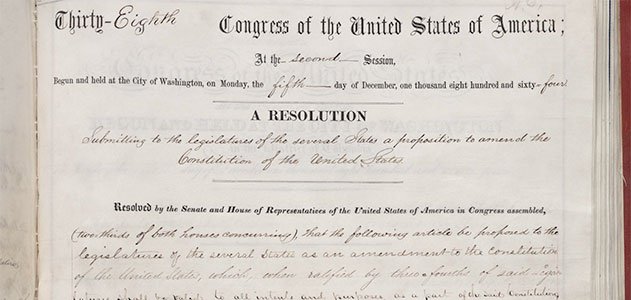Mississippi's Late Ratification of the 13th Amendment
On this day in 1995, Mississippi tried to ratify the 13th Amendment, which prohibits slavery “except as a punishment for crime”. This article explores why it took Mississippi so long to ratify the Amendment, and the role of GOP legislators in this process.

Ibram X. Kendi
Partner • #GirlDad • Scholar @BU_Tweets • Dir @AntiracismCtr • @NationalBook Award Winner • #1 NYT Bestselling Author • MacArthur Fellow • Surviving Cancer 🐍

-
On this day in 1995, Mississippi tried to ratify the 13th Amendment, which prohibits slavery “except as a punishment for crime.” 1995 is not a typo.
— Ibram X. Kendi (@DrIbram) March 17, 2023
Why did it take Mississippi so long? Basically, as GOP legislators would say today, the 13th Amendment was too “woke.” A 🧵 1/ pic.twitter.com/AfonSgdA5f -
When it came to the scale of slavery (and the need to protect it through Civil War), only South Carolina surpassed Mississippi. SC left the Union in Dec. 1860, followed by MS in Jan. 1861. 57% of SC's population were enslaved Black people, while 55% of Mississippians were. 2/ pic.twitter.com/hliF9w2wy9
— Ibram X. Kendi (@DrIbram) March 17, 2023 -
Mississippi enslavers resisted abolition, even after Robert E. Lee's surrender in April 1865. By that December, more than three-fourths of the states in the US had ratified the 13th Amendment, making it part of the Constitution. 3/ pic.twitter.com/IlrO89M2to
— Ibram X. Kendi (@DrIbram) March 17, 2023 -
Every U.S. state ratified the 13th Amendment before 1870. Well, except Kentucky (which waited until 1976) and Mississippi. Why? On December 4, 1865, MS legislators resolved that they wished “to withdraw [discussion of] the negro race from national and state politics." 4/ pic.twitter.com/hZ6jQQutqR
— Ibram X. Kendi (@DrIbram) March 17, 2023 -
In the resolution, MS legislators also stated that the amendment would spur "radicals and extremists" to "vex and harass the country on the pretension that the freedom of the colored race is not perfect and complete until it is elevated to ... equality with the white." 5/ pic.twitter.com/LibiILcYpn
— Ibram X. Kendi (@DrIbram) March 17, 2023 -
Although it didn't immediately ratify the amendment, Mississippi immediately exploited its loophole for slavery "as a punishment for crime.” After the Civil War, MS legislators used their Black Codes, convict leasing, and vagrancy laws to amass enslaved labor for plantations. 6/ pic.twitter.com/NA3V4U3m6g
— Ibram X. Kendi (@DrIbram) March 17, 2023 -
Through the 20th century, Mississippi still made no moves to ratify the amendment. In 1994, Gregory Watson of TX (who played a major role in ratifying the 27th Amendment), noticed MS had never ratified the 13th Amendment. 7/ pic.twitter.com/SU543cIkuA
— Ibram X. Kendi (@DrIbram) March 17, 2023 -
Watson notified Black Mississippi legislators, and even drafted a resolution for them to propose. It worked. On March 16, 1995, Mississippi legislators finally voted to ratify the 13th Amendment. 8/ pic.twitter.com/qNsvkbHtvP
— Ibram X. Kendi (@DrIbram) March 17, 2023 -
But the saga wasn't over: The Mississippi legislature did not notify the Archivist of the United States of the ratification. So, it still wasn't official. 9/ pic.twitter.com/hP0gUzm0Tp
— Ibram X. Kendi (@DrIbram) March 17, 2023 -
In 2013, two Mississippians, Dr. Ranjan Batra and Ken Sullivan, notified the legislature of the problem. Mississippi then notified the Archivist, thus officially ratifying the 13th amendment abolishing slavery 10 years ago. 10/10 pic.twitter.com/rEs0NcxKzd
— Ibram X. Kendi (@DrIbram) March 17, 2023
